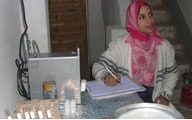
Developing Reliable, Transparent Marketing Channels For Smallholder Farmers
The dairy and livestock sector in Egypt has historically suffered from inefficient marketing channels, a lack of reliable market information, weak agribusiness management skills and an absence of economies of scale. Through the Dairy and Livestock component of the USAID-funded Agricultural Exports and Rural Income (AERI) program, ACDI/VOCA helped address these constraints and strengthen the sector by improving access to resources, information and markets. Thanks to the program’s interventions, production for domestic and international markets has improved, and the Egyptian livestock and dairy sector has taken great strides toward reaching its full potential.
The project, which ended in September 2007, employed ACDI/VOCA’s market-driven, business-oriented approach, applying a range of technical and business improvement strategies that focused interventions on two key actors in the value chain: small-scale producers and value-adding processors. The strategy addressed the lack of economies of scale among buffalo and cow producers and the lack of technical knowledge among processors. To strengthen the competitiveness of the sector as a whole, the project also integrated direct training to key support service providers such as veterinarians and feed suppliers, encouraged the development of business development skills for all its beneficiaries, and addressed constraints in the overall business environment such as limited access to finance.
AERI activities centered on achieving the following results:
- improving smallholder product quality and volume
- increasing the profitability of processors and traders
- strengthening input supply and other agricultural support services
- increasing efficiency in the market chain
“I’ve been raising animals for 10 years now, but I have never before experienced the amount of milk, cheese and ghee I did with this year’s increase. I want to convey what I learned with AERI to everyone in the village in order to increase their income through simple and costless practices.”
~Om El Ghareeb, AERI beneficiary
Project impact was substantial: over the course of the 4-year, $8.4 million project, AERI assisted 47,452 smallholder farmers. Among direct beneficiaries, buffalo milk production increased by 63 percent and cow milk production by 153 percent. The average selling price of animals increased by 21 percent, and net incomes increased by more than 20 percent. A dozen new dairy products were developed and 10 overseas study tours for 99 beneficiaries took place in India, Turkey, Morocco, Kenya, and the United States.
The project provided a combination of training, technical assistance, marketing linkages, and study tours to 7,438 livestock smallholders and the 46 marketing associations into which they were organized (from a base of 327 small farmer groups) and 109 dairy processors. Key to this success was AERI’s recruitment, training, and outreach through 331 village business promoters—local villagers who served as the “arms and legs” of the project on a daily basis, promoting technology practices and business concepts. To upgrade the quality of support services available to smallholders, AERI also provided technical training, business skill development, and linkage activities to 309 livestock extension agents and 309 veterinarians.
ACDI/VOCA responded to the outbreak of several serious animal diseases by organizing 35 veterinary campaigns that reached 97,000 livestock animals by project’s end and helped establish linkages between remote smallholders and veterinarians. ACDI/VOCA also worked with the Assuit Business Association (ASBA) to offer loans to smallholder association members to encourage better, more lucrative fattening practices. The loan package bases the repayment schedule on the fattening and sales cycle and promotes application of standards and procedures for selecting and grading animals. By the end of the project, 397 smallholders had received loans totaling over $650,000. ASBA, a nongovernmental organization providing microcredit in Upper Egypt, will continue the management, funding and promotion of this program, making it one of AERI’s important sustainable legacies.
As a capstone event to solidify future collaborative efforts between smallholders and other powerful stakeholders, ACDI/VOCA sponsored three regional workshops and a cumulative national conference in September 2007. Over 800 people attended the conference, including 650 smallholders and processors as well as 150 local and international industry experts, large-scale private sector actors and donors. To promote continued technology diffusion, AERI produced 26 “leave-behind” training materials and handouts, ranging from pamphlets and manuals to sliding rulers and feed formulation discs to recordkeeping tables.
“Improved linkages, including more formal partnerships between producers and processors and a strong reduction in use of raw milk traders, have greatly improved milk quality and increased producers’ income. This movement will grow and become a significant AERI legacy for sustainability.”
~Independent Midterm Evaluation
A socioeconomic impact assessment revealed that benefits to participating smallholders include increased access to resources and opportunities, awareness about animal nutrition and health, access to veterinary services, new value-added dairy products, improved access to markets, entrepreneurial capacity development, increased income, human assets and empowerment of women. This last benefit was particularly striking; in Egypt it is customary for women to tend to cows and buffalo while men tend to the fields, and thus, the majority of AERI’s beneficiaries were women. AERI improved the financial well-being of these women by arming them with the skills and knowledge to earn a higher income from their milk production activities and by helping them take advantage of new business opportunities, such as production of value-added dairy products. For female-headed households in particular, the project’s economic activities minimized their vulnerability.
While challenges remain in the Egypt livestock sector, there are many distinct opportunities for this sector to contribute to exports and the domestic food processing industry while alleviating household poverty. The value chain can further be strengthened by enhancing cooperation, encouraging AERI-formed associations to partner with nascent associations, and encouraging other stakeholders in the value chain to participate in this process. Other opportunities lie in access to credit, improved technical, managerial and business skills for private sector extension agents, and linking smallholders to transparent market channels through village-based associations.
PDF version of profile (399 KB)





